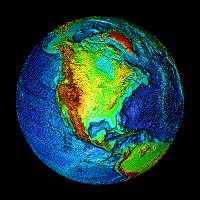Thousands of marine mammals, sea turtles, seabirds and others, are choked or poisoned each year by eating trash discarded in the ocean… —Report
In a week that another tourist cruise ship on its way to destroy what is left of the fragile Antarctic ecosystems breaks down, giving the thousands of passengers time to reflect on their destructive behavior, a report by U.S.-based Ocean Conservancy provides a “global snapshot of marine debris,” a record of garbage collected by about 400,000 volunteers in 104 countries and locations in a single day in September 2008.
Tourism: A Major Destructive Force

P&O Aurora (in the background) passenger Reg Hirst and his wife (not picture) from Yorkshire, England, were among the 2,000 tourists whose trip around New Zealand was disrupted by a broken propeller on the ship. They had to stay in Auckland for a few nights (not as nice as Sydney, they said) but that’s no problem because there’s lots more to do on the way to San Francisco. Photo by JOHN SELKIRK/Dominion Post. Image may be subject to copyright.
The MV Aurora is owned and operated by P&O Cruises (now a part of Carnival Corporation). The ship has a Gross Registered Tonnage (GRT) of 76,152 tonnes and is 270 m long. It can carry about 2,000 passengers and a crew of about 900. Aurora produces an estimated 6,500 tons of garbage and human waste and 100,000,000 liters of graywater each year. Aurora’s 4 engines produce about 60,000 kW of power enough to provide electricity for about 7,000 households. The carbon footprint for Aurora (full operation mode inclusive of passenger activities) is an estimated 500,000 tons of CO2 per year. In February alone, a staggering 25 cruise ships visited Auckland, New Zealand.
The highlights of the Ocean Conservancy report, a Rising Tide of Ocean Debris, is listed below.
1. A tidal wave of ocean debris is a major pollution problem of the 21st century.
2. Certain categories of debris show up more often in certain places.
3. Of the 43 items tracked during the Cleanup, the top three items of trash found in 2008 were cigarette butts, plastic bags, and food wrappers/containers.
4. Marine debris kills. Every year, thousands of marine mammals, sea turtles, seabirds, and other animals are sickened, injured, or killed because of trash in the ocean. Animals choke or become poisoned when they eat trash, and drown when they become entangled in bags, ropes, and old fishing gear.
5. Marine debris degrades ocean health and compromises its ability to adapt [sic] to climate change.
Full report is available for download at A Rising Tide of Ocean Debris and
For more information, visit their site at Ocean Conservency: Start a Sea Change.
Related Links:




